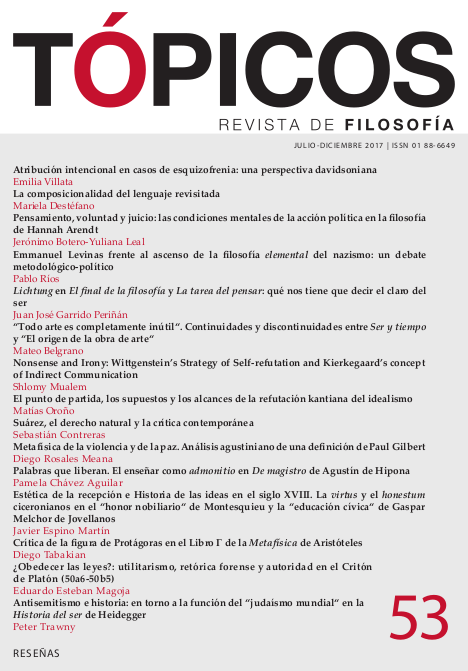Atribución intencional en casos de esquizofrenia: una perspectiva davidsoniana
Publiée 2017-07-01
Mots-clés
- atribución intencional,
- Donald Davidson,
- delirios,
- esquizofrenia
Comment citer
Résumé
Actualmente se debate si el enfoque davidsoniano de la atribución intencional puede extenderse a casos de sujetos delirantes que sufren diversos trastornos psiquiátricos. En particular, respecto a los casos graves de esquizofrenia, se ha afirmado que debido a las características que presentan los sujetos diagnosticados, éstos no podrían satisfacer los requisitos de racionalidad estipulados por Davidson para ser considerados agentes intencionales. Por lo tanto, en tales casos no sería posible siquiera identificar los contenidos mentales de sus delirios. En este artículo desafiaré esta perspectiva y, vinculando la discusión sobre racionalidad animal y racionalidad en sujetos con esquizofrenia, sostendré que, una vez revisados y matizados algunos principios del enfoque davidsoniano, éste puede extenderse gradual y legítimamente a sujetos con esquizofrenia, incluso en casos de gravedad. Asimismo, propondré dos estrategias metodológicas que permitan generar evidencia a favor de la atribución de –al menos– algunas creencias simples a estos sujetos, sin tener que dejar de tratarlos como agentes con algún grado de intencionalidad.
Références
- American Psychiatric Association (2000). Diagnostic and Statistical Manual of Mental Disorders: DSM-IV-TR (4th ed., text revision.). Washington, DC: American Psychiatric Association.
- American Psychiatric Association (2014). Diagnostic and Statistical Manual of Mental Disorders: DSM-V-TR (5th ed., text revision). Washington, DC: American Psychiatric Association.
- Bennett, J. (1976). Linguistic Behaviour. Cambridge: Cambridge University Press.
- Bermúdez, J.L. (2003). Thinking Without Words. Oxford: Oxford University Press.
- Berrios, G. E. (1991). Delusions as “Wrong Beliefs”: a Conceptual History. En The British Journal of Psychiatry. Supplement, (14), 6–13.
- Bortolotti, L. (2005). Delusions and the Background of Rationality. En Mind and Language, 20 (2), 189–208. doi:10.1111/j.02681064.2005.00282.x
- Campbell, J. (2009). What does Rationality have to do with Psychological Causation? Propositional Attitudes as Mechanisms and as Control Variables. En Psychiatry as Cognitive Neuroscience: Philosophical Perspectives. M. Broome & L. Bortolo i (eds.)(137–149). Oxford:
- Oxford University Press.
- Carruthers, P. (2008). Meta-Cognition in Animals: A Skeptical Look. En Mind and Language, 23, 58-89.
- ____ (2006). The Architecture of the Mind. Oxford: Oxford University Press.
- Cherniak, C. (1986). Minimal Rationality. Cambridge: MIT Press.
- Crane, T. (2009). Is Perception a Propositional Attitude? En Philosophical Quarterly, 59 (236), 452-469.
- Darias Martín M., Fernández Cabrera, N., Gutiérrez, M., López Florido, G. Pérez Chico, D. y Pérez Torres, L. (1997). Aspectos internos y externos de la racionalidad: ¿cuáles son los umbrales de racionalidad exigibles y cómo situarlos? En Contextos, 15 (29), 153-178.
- Davidson, D. (2004). Problems of rationality. Oxford: Oxford University Press.
- ____ (2003). Subjetivo, intersubjetivo, objetivo. Madrid: Cátedra.
- ____ (2001). Inquiries into Truth and Interpretation. Oxford: Clarendon Press.
- ____ (1997). La aparición del pensamiento. En Subjetivo, intersubjetivo, objetivo. (170-190). Madrid: Cátedra.
- ____ (1985). Incoherence and irrationality. En Dialectica, XXXIX, 345-354.
- ____ (1982). Two Paradoxes of Irrationality. En Philosophical Essays on Freud. R. Wollheim & J. Hopkins (eds.) (289-305). Cambridge: Cambridge University Press.
- ____ (1980). Essays on Actions and Events. New York: Oxford University Press.
- ____ (1974). Beliefs and the Basis of Meaning. En Synthese, 27, 309-323.
- ____ (1973). Radical Interpretation. En Dialectica, 27, 314–28.
- Dennett, D. (2000). Tipos de mente. Madrid: Debate.
- ____ (1971). Intentional Systems. En The Journal of Philosophy, 68 (4), 87- 106.
- Fulford, K., Thornton, T. & Graham, G. (2006). The Oxford Textbook of Philosophy and Psychiatry. Oxford: Oxford University Press.
- Gerrans, P. (2004). Cognitive Architecture and the Limits of Interpretationism. En Philosophy, Psychiatry, & Psychology, 11 (1), 43–48. doi:10.1353/ppp.2004.0039
- Glock, H. J. (2003). Quine and Davidson on Language, Though and Reality. Cambridge: University Press.
- ____ (2000). Animals, Thoughts and Concepts. En Synthese, 123, 35-64.
- Hecker, E. (1995). La hebefrenia. Contribución a la psiquiatría clínica. En Revista de la Asociación Española de Neuropsiquiatría, 15 (53), 97-103.
- Klee, R. (2004). Why Some Delusions Are Necessarily Inexplicable Beliefs. En Philosophy, Psychiatry, & Psychology, 11 (1), 25–34. doi:10.1353/ppp.2004.0044
- Lurz, R. (2009). Animal Minds. En Internet Encyclopedia of Philosophy. Recuperado de: http://www.iep.utm.edu/ani-mind/.
- ____ (2007). In Defense of Wordless Thoughts about Thoughts. En Mind and Language, 22, 270-296.
- Organización Mundial de la Salud (OMS) (1992). CIE-10.Clasificación internacional de las enfermedades, trastornos mentales y del comportamiento (10° ed.) Madrid: Méditor.
- Prinz, J. (2002). Furnishing the Mind. Concepts and their Perceptual Basis. Cambridge: MIT Press.
- Reimer, M. (2012). Davidsonian Holism in Recent Philosophy of Psychiatry. En Donald Davidson on Truth, Meaning, and the Mental. G. Preyer (ed.) (249-269). Oxford: Oxford University Press. DOI:10.1093/ acprof:oso/9780199697519.003.0012
- ____ (2011). A Davidsonian Perspective on Psychiatric Delusions. En Philosophical Psychology, 24(5), 659–677. doi:10.1080/09515089.2011.5 62642
- Schwitzgebel, E. (1997). Words about Young Minds: The Concepts of Theory, Representation, and Belief in Philosophy and Developmental Psychology. Dissertation. Department of Philosophy, U.C. Berkeley. Recuperado de: http://www.faculty.ucr.edu/~eschwitz/SchwitzPapers/Diss.pdf
- Searle, J. (1996). Intencionalidad. Madrid: Tecnos.






